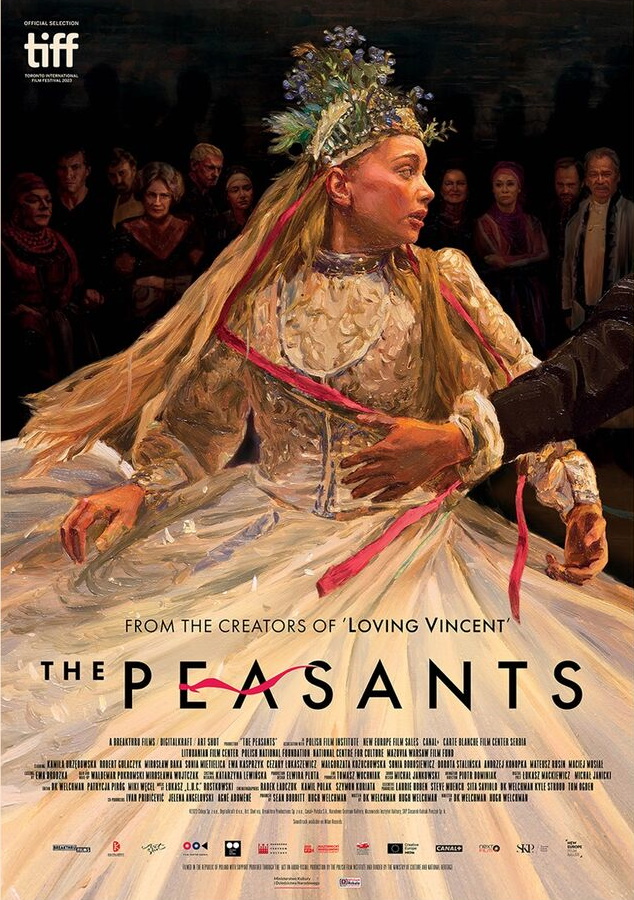The Peasants
The Peasants FL, 2023, 3 stars
Paint it black
Loving Vincent follow-up is brutally dark
 Exclusive to MeierMovies, March 2, 2024
Exclusive to MeierMovies, March 2, 2024
In 2017, Dorota Kobiela, Hugh Welchman and more than 100 artists redrew animation history with Loving Vincent, the first entirely oil-painted feature. Though the movie used rotoscoping for many of its characters, a technique by which animators draw over live-action footage, all frames were painted by hand, with no digital manipulation.
That film was a masterpiece not just for its artistry but because it told a tale perfectly suited to paint. Indeed, in my review, I called it the best animated movie of the century and the most nobly conceived of all time. That latter praise is due to the film’s re-creation of Vincent van Gogh’s paintings and people, and the use of those painted people to try to explain the artist’s death. It is impossible to imagine it as anything but animated.
The same cannot be said for the follow-up, The Peasants. Though the Polish Kobiela and English Welchman are now happily married – that’s an amazing story by itself – they have failed to marry story and craft as seamlessly as they did seven years ago. And while the new Polish-language film is predictably beautiful, representing another leap forward in adult animation, the movie is only as good as its writing and live-action footage, which is unrelentingly brutal, occasionally monotonous and sometimes ham-fisted.
The story is based on Władysław Reymont’s early 20th-century novel, which tells the tale of Polish peasants, particularly the misfortunes of beautiful, young Jagna (Kamila Urzędowska). Forced to marry the much older but considerably wealthy Maciej (Mirosław Baka) and ultimately misjudged by the petty, gossiping villagers, Jagna becomes the Hester Prynne of the village of Lipce. The film contains powerful moments of passion and tragedy, to be sure, particularly in the relationship between Maciej and his son, Antek (Robert Gulaczyk), with whom Jagna has an affair. But these moments fade rather quickly, one spectacular image passing into another without leaving enough of an impact, possibly because, except for Jagna, the characters simply aren’t likeable or relatable. (Perhaps Polish director Jan Rybkowski’s 1973 adaptation was more emotionally satisfying.)
The central metaphor of the film (and the novel, which was published in four parts) is the changing of the seasons, and the events occur over roughly one year, allowing the animators to utilize a variety of landscapes and color palettes. But the happenings don’t necessarily correspond to the seasons. There is no rebirth in spring, for example, only a relentless march toward sadness, proving again that the story is an odd fit for the style.
But at least the changing seasons allow the artists to pay homage to great works of art. The tributes aren’t as obvious as in Loving Vincent, but Polish art enthusiasts familiar with Józef Chełmoński and Ferdynand Ruszczyc, among others, will likely appreciate them. Music plays a strong part too, with Polish rapper and activist Łukasz Rostkowski’s score driving much of the action and sentiment.
Despite The Peasants’ incongruity, I eagerly anticipate the Welchmans’ next project. I just hope it is less unpleasant. But perhaps unpleasantness is the point, as the filmmakers push the boundaries of animation, filling their film with fighting, death, betrayal, poverty, starvation and rape. This isn’t Disney. It’s not Miyazaki. It’s not even Jérémy Clapin, of severed-hand fame. It’s unspeakable ugliness portrayed in the most beautiful way.
© 2024 MeierMovies, LLC
For more information about this movie, visit IMDB and Wikipedia. The film premiered at the 2023 Toronto International Film Festival and is now playing in theaters. It was the Polish entry for the best international feature for the 2024 Academy Awards but didn’t make the final cut for that award or best animated feature.